Click on images to enlarge
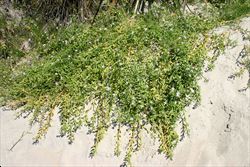
infestation (Photo: Trevor James)
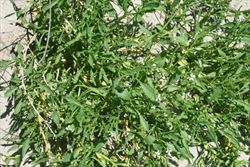
habit (Photo: Trevor James)
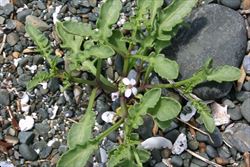
lower leaves (Photo: Trevor James)
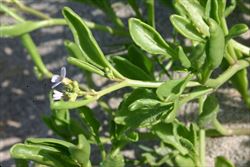
upper leaves and flowers (Photo: Trevor James)
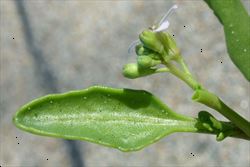
close-up of upper leaf and flower buds (Photo: Trevor James)
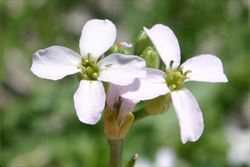
close-up of flowers (Photo: Trevor James)

close-up of immature fruit (Photo: Trevor James)
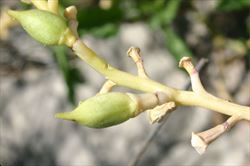
close-up of mature fruit (Photo: Trevor James)
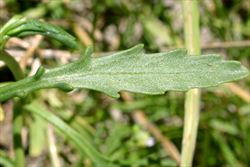
close-up of lower leaf (Photo: Trevor James)

close-up of fruit showing two segments (Photo: Trevor James)

close-up of bases of old fruit (Photo: Trevor James)

comparison of European sea rocket (Cakile maritima subsp. maritima), on the left, and American sea rocket (Cakile edentula), on the right (Photo: Trevor James)
Scientific Name
Cakile edentula (Bigelow) Hook.
Synonyms
Bunias edentula BigelowCakile californica A. HellerCakile edentula (Bigelow) Hook. subsp. edentulaCakile edentula (Bigelow) Hook. var. edentulaCakile edentula (Bigelow) Hook. subsp. californica (A.Heller) HultenCakile lanceolata (Willd.) O.E. Schulz var. australiensis Thell.Cakile maritima Scop. (misapplied)
Family
Brassicaceae (Queensland, New South Wales, the ACT, Victoria, Tasmania, Western Australia and the Northern Territory)Cruciferae (South Australia)
Common Names
American sea rocket, American sea-rocket, American searocket, sea rocket
Origin
Native to North America (i.e. eastern Canada and eastern USA).
Naturalised Distribution
Widely naturalised in the coastal districts of eastern and southern Australia. From central and southern Queensland, through New South Wales, Victoria, and South Australia to south-eastern parts of Western Australia. Also naturalised along the coasts of Tasmania and on Lord Howe Island.
Notes
American sea rocket (Cakile edentula) is a common weed of coastal environs (i.e. in foredunes, along seashores and on offshore islands). It is regarded as an environmental weed in Victoria, Tasmania, South Australia, Western Australia, New South Wales and south-eastern Queensland.
This species also hybridises with European sea rocket (Cakile maritima subsp. maritima) and intermediates between the two plants are common or dominant in some areas.

